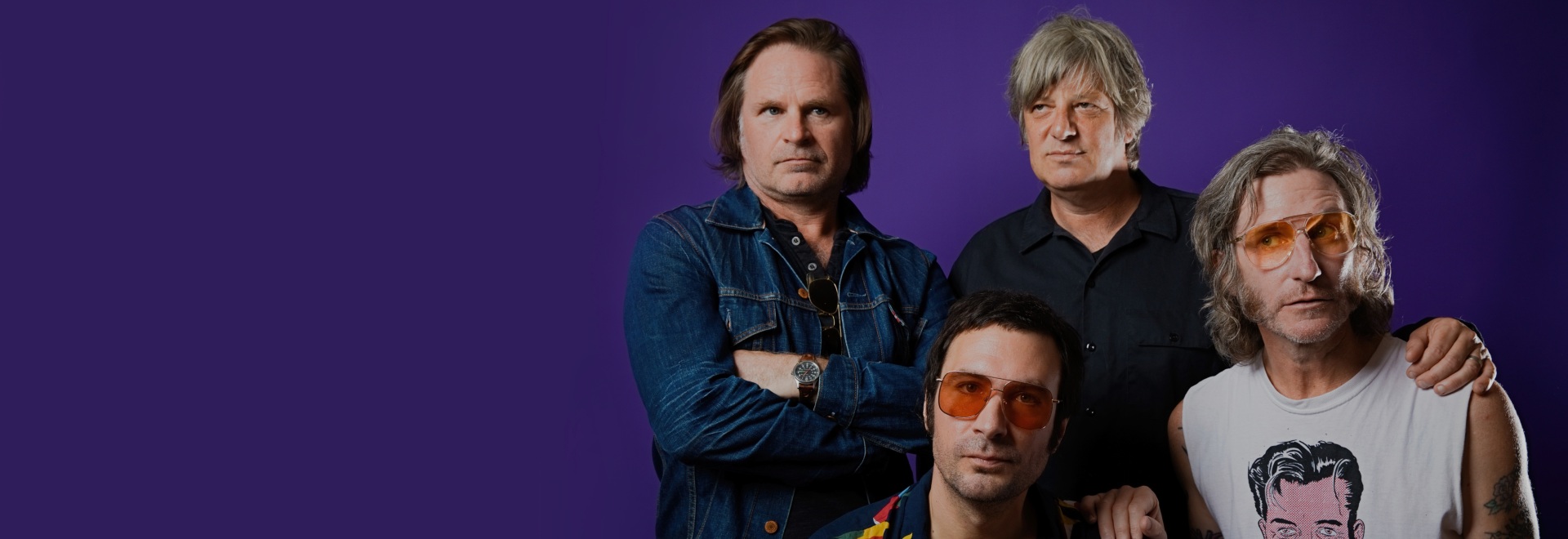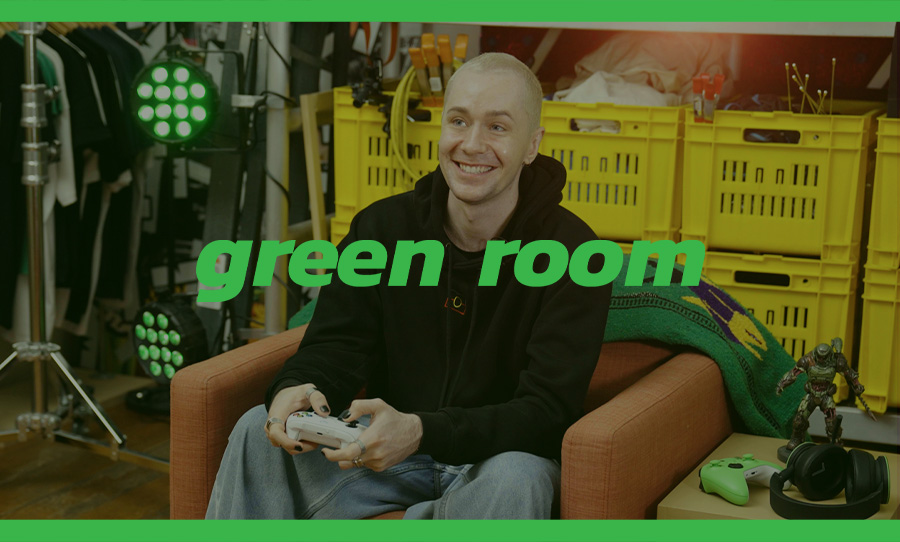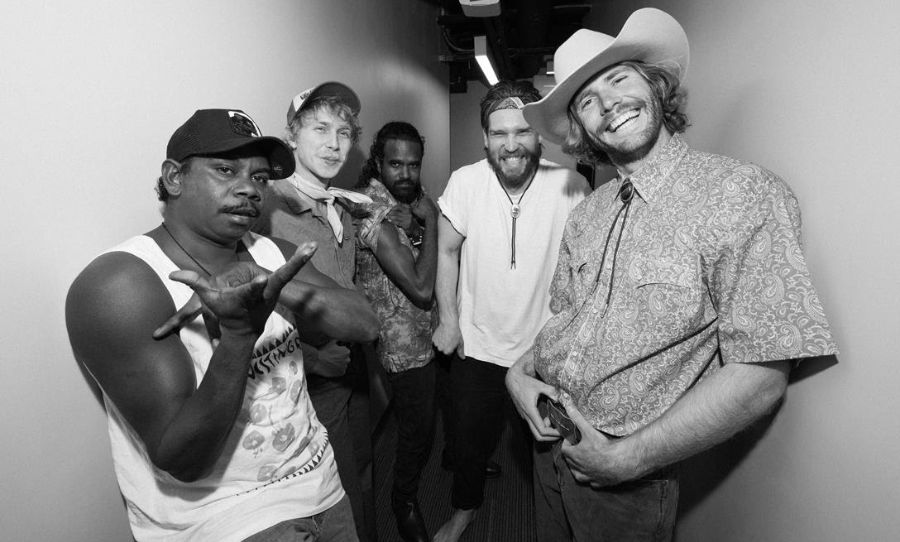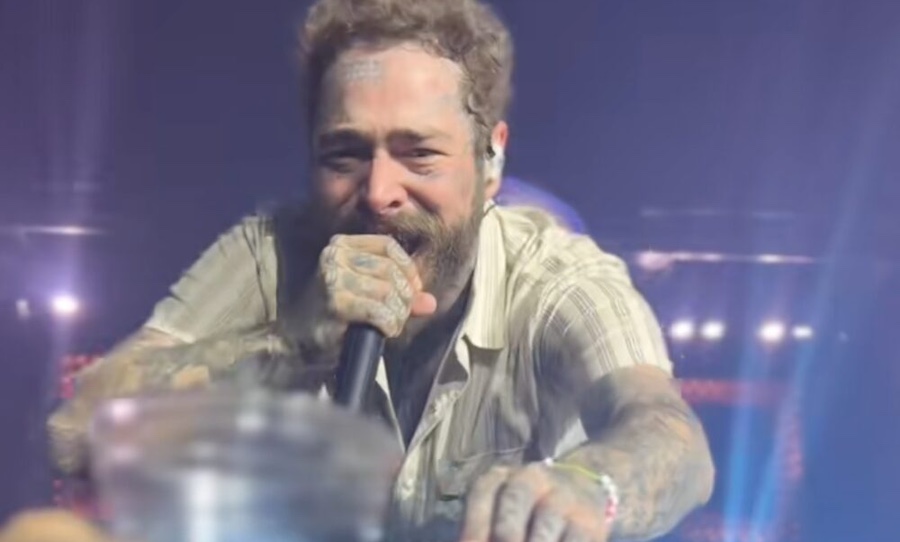While lockdown had a profound effect on creativity, You Am I managed to piece together a tale of nostalgic hope, as the world around them changed forever.
With many of the songs being written in 2019, You Am I’s latest LP, The Lives Of Others was recorded and produced during lockdown while the band’s veteran-members – Davey lane, Rusty (Russell) Hopkinson, Tim Rogers and Andy Kent – were separated across the country,
The result is an album that flows between ballads and headbangers, acting not just as a souvenir of a simpler time, but also as a testament to the cathartic power of music. Happy had the chance to sit down with You Am I’s lead Guitarist, Davey Lane, and drummer, Rusty Hopkinson, to chat about reclaiming the past, and creating art in unfamiliar conditions.

HAPPY: So, I guess, I sort of want to first ask, how are we all doing today?
RUSTY: Good.
DAVEY: Well! It’s good to be back in Sydney. It’s good to be together as a group for the second time in a year. We were only together for the first time a couple of weeks ago, and the time between that and the last time we’d seen each other… we made a record.
HAPPY: Just casually.
DAVEY: Yeah.
RUSTY: Yeah. At time’s pretty casually. Other times, it’s… It took us a lot longer than it would normally take us to make a record.
DAVEY: Yeah. There were… with the draconian Melbourne situation, that kind of hindered the ability for Tim and I to get together, and that was that for a few months.
RUSTY: I ended up being stuck in Perth in December. It was always going the idea that we’d get together to finish the record, but sort of stuff kept happening…
HAPPY: Yeah.
RUSTY: And giving us other things.
DAVEY: And the world changed…
RUSTY: And we ended up not being able to spend as much time together as we would like, which was none.
HAPPY: But I guess, during this very interesting way to create a record, is this something… what have you learned from creating a record where you’re all separated from each other and can’t really use a studio space to interact?
RUSTY: Well, I think when I first went in at the start and started playing drums, and Andy’s there as well, I think I realised what a visual sort of thing it is when you play in a band, and how like, you know, the way Tim might swing his hips if he’s playing a particular beat, and you think that’s kind of where we need to be. Or if it’s not, you can feel like it’s not happening. So, there was that kind of thing where you didn’t have that. It’s like you’re robbed of that kind of sense that you had to kind of imagine it, I guess. And in some ways, it made it harder, and in some ways it made it easier, because you just went in and was like, ‘Oh, I’m just going to do this’, and no one second-guessed it…
DAVEY: Absolutely. And we’ve been playing together for so long, there is… we’ve kind of been playing together… I’ve been with the band for twenty-three years, and these guys for thirty-plus, and it’s just… you develop a kind of… it’s cliché to say, but a telepathy over time. I know on stage, if Russell’s lunging into the feel, I feel like we can kind of read where it will land.
RUSTY: Yeah.
DAVEY: And there was a lot of that with this record, and for us stuck down in Melbourne. Once we got Andy and Russ’s parts, there was… it was just, yeah, close your eyes and imagine we’re all together doing it, and yeah, I kind of think of this record like making a game of Jenga, because Tim and I were together for this kind of nascent, very basic…
RUSTY: Very rudimentary.
DAVEY: Absolutely.
RUSTY: Really just guitar and vocals. And that helped us sort of move in… gave us probably more space for moving in some ways…
DAVEY: Absolutely.
RUSTY: And complete songs that you kind of just have to slot into.
DAVEY: And that was the thing. Once we got their parts back, it was like, we pull out what we did, and build on top of their new foundation, and it was… yeah, it was… I wouldn’t wanna make every You Am I album this way.
RUSTY: Yeah, it was kind of… it was just an interesting process because you really didn’t have any foreshadowing of what things might sound like. It was genuinely like, ‘I wonder what they’ve done?!’
DAVEY: Yeah!
RUSTY: I don’t think I’ve ever had that feeling about a recording before, because we’re usually all together, or you’re at least in the room together when it’s going down. But when we’re in Sydney, or in Perth, and you get these little nuggets, and you’re like, ‘Oh, listen to that!’
DAVEY: And when Andy and Russ were going into the studio up here, I might be on my government-imposed one hours worth of outdoor activity per day, and I was like, ‘I wonder what they’re up to!’ And at the end of the day, we’d get a desk mix through, and I’d sit in my little studio room, and crack a beer, and listen to what you guys had gone. And it was really quite an emotional thing to listen to these guys play on this thing we’re building together, and it was…
RUSTY: Yeah. And when we got out of lockdown in Sydney, we had to go to the studio, and just wail away. It was kind of, I think, cathartic really. Because it was such a strange time, where like everything you love doing gets cut off. It’s like OK, you can’t travel, you can’t play… So, you suddenly feel very bereft of – I don’t know. Inputs. So, to be able to just go in there and have all these songs, and bash your way… and we started recording, doing stuff all in our own room. Like I had my own drum kit set up in lockdown, and doing all these parts and demos. So, a lot of them influenced how the record was played, sound-wise. Some of the drums were very compressed in the style of how I play, because I was sitting in the record room of my little apartment in the middle of Marrickville, and I’ve gone to my neighbours and been like, ‘I’ll play an hour of drums a day, I’ll try not to be too loud.’ But it’s a big double brick art-deco building, so they were pretty happy to let me do that for a little while. So I’d just sit there and tinker away. I think we were all just sat there in our little boxes, tinkering away, trying to figure something out.
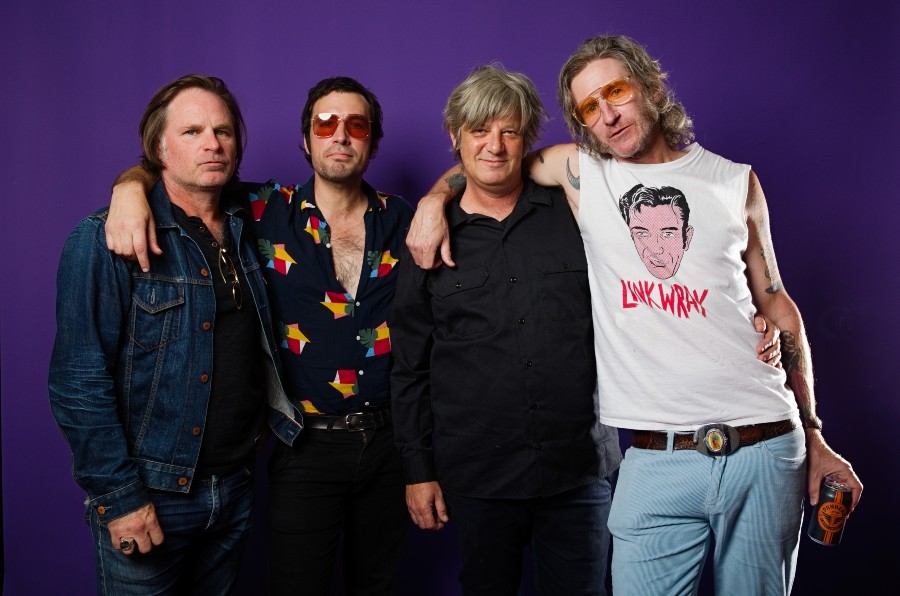
DAVEY: I don’t think there was any kind of spoken word, or any line in the sand drawn where we decided… because it initially started as ‘Well, let’s just throw some ideas around because we’re all fucking stuck in a, you know, blah blah blah.’ I don’t think there was any kind of point where we were like, ‘Oh OK, we’re not making demos, we’re making a record!’ Just everything kind of…
RUSTY: It’s like a flower! Lots of little blossoms…
DAVEY: From a statement to a…
RUSTY: But it did really just grow. And then it became apparent that you know, ‘It’s pretty good, we should probably get someone to mix it, and put it out’, and all that kind of stuff, so that was what happened next after all that.
HAPPY: It sounds very therapeutic in lockdown, to have that to work towards, and to connect you all together.
DAVEY: Well, to have an outlet to be able to do that, to be afforded the opportunity to be able to do that, and for us to have… we’ve all got imaginations, and we like to do these kind of things anyway, when we’ve got time off, regardless of, you know, whether the plague is happening or not. It’s… yeah, it’s just what I do with my spare time anyway, so it’s good to have a focus and direction, and go like, ‘OK, I’m working towards something here.’ It was therapeutic. It always is.
RUSTY: And therapeutic things in that state were kind of hard to come by, really, in a lot of ways. It was like walking dogs, sit at home playing records, it’s kind of fun. It’s good to have other things happening.
DAVEY: Yeah. It was good, but the time where you’re like, ‘I feel like a beer now!’ got earlier and earlier every day…
HAPPY: Or a spliff…
DAVEY: Yeah, yeah, absolutely.
RUSTY: Absolutely.
HAPPY: I sort of wanted to ask, because I know a lot of the sounds you wrote, for example, in 2019, started off very folky in mind. And when you get that sort of change, what was the link between you going from this sort of fun edged rock?
DAVEY: Well, I think that’s kind of one for Tim really. But I think he initially wrote these songs with something else in mind – like maybe a solo record or something. But when we kind of got together, it was like, ‘Well, let’s throw some band ideas around.’ And that shifted the approach. And yeah, it was just right from the get-go, I think, was just Tim coming over to my place, and sitting down, and playing the songs with me. And I imagine Russ going hell for leather, and just…
RUSTY: Yeah, so it’s a lot of imagination involved, I think. A lot of it happened in our heads, in terms of imagining, ‘How do you make this sound…’ Like you’ve got to imagine being in the room together.
DAVEY: Yeah.
RUSTY: And Tim just threw these songs out there. I think he said, ‘These were for some record I was going to make, but you guys have a crack at it.’ And I think we maybe turned them on their head a bit maybe.
DAVEY: Yeah.
RUSTY: And I think he just went, ‘Oh, cool.’ Just pretty casual. I don’t think a lot of thought was even put into it. He just had them there, and thought…
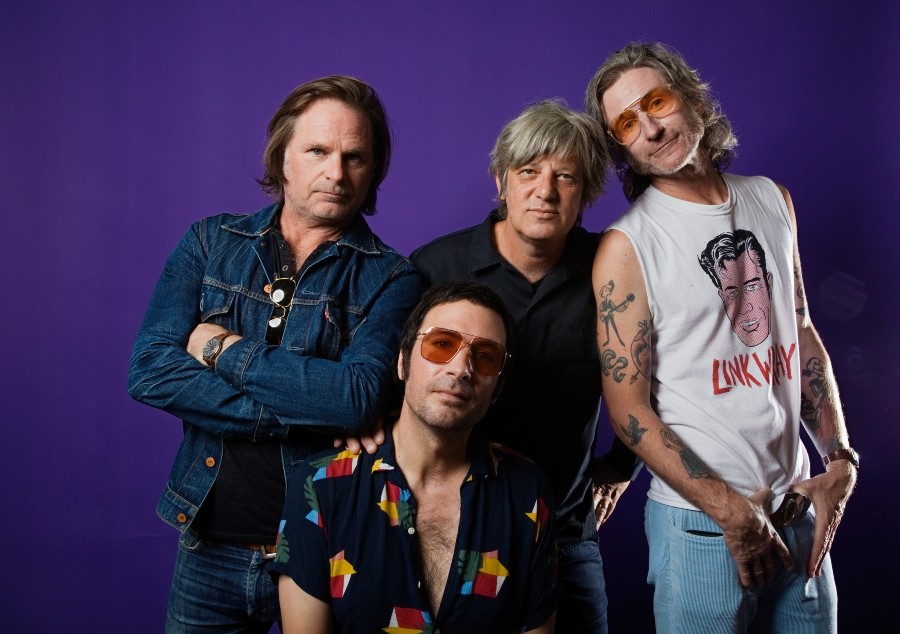
DAVEY: Yeah, absolutely.
RUSTY: ‘These are pretty good. Maybe they are your guys’ songs.’
DAVEY: Yeah. And Tim would come over with the book, and he was like, ‘Oh, that one.’ He’s got a… you know. He’s always writing, and yeah, I don’t think there was any like, ‘Right, well, we’re going to start with this song.’ It was very arbitrary, just like ‘that one, bang, there you go’. There was a few songs on the record, like the single that came out a few weeks ago – The Waterboy. That was one that was immediately for me like, ‘This is a fucking classic, You Am I song…’
RUSTY: Yeah.
DAVEY: And right from the get-go, it’s like you can imagine… like Russ was saying, imagination played such a big part in it. You could imagine what it’d end up sounding like.
RUSTY: Yeah. There’s a song called DRB Hudson that Tim wrote. Someone said to me, ‘How did you get it to sound like a live band?’ and the thing was like, as soon as you hear the chords in that song, I can imagine seeing the band, playing some sixties freak beat record, and talking about the drum feels… It’s like all that stuff, it doesn’t come from nowhere. It comes from, like, things we’ve talked about, so you sort of imagine… You have to use that collective memory to sort of connect a bit, I don’t know.
DAVEY: Yeah, I think that’s…
RUSTY: So as soon as I heard that chorus, I thought, ‘Right, I’m going to make that sound like the Tinturn Abbey, or something like that…’ Like some insanely obscure sixties bands…
DAVEY: Absolutely.
RUSTY: But yeah, it was just like… And it was a big leap of faith for Tim, to just hand them over and let us at them, as it were.
DAVEY: DRB Hudson was one in particular that I just got back, and yeah, like… Head blown clean off by your drum part. It was like, ‘Is he serious? Argghhhh!’
RUSTY: It’s like catharsis in process! I was just like, ‘Holy shit, I’m in the studio!’ which was in like the Universal building, and it was completely empty. There’s usually like, 5000 employees or whatever in there, but it’s completely empty there in the studio. And it was kind of just like, fresh out of the house, the first time I’d gotten an Uber and went somewhere – out to the studio to play with all my friends, in my mind! And with Andy…
DAVEY: And played, like, the record?
RUSTY: It was a very odd way to make a record, and it was an odd time to make a record, so it was just where you were gonna make it.
HAPPY: Do you think you’ll take this Exquisite Corpse kind of approach in the future? Is this something you sort of like…
DAVEY: I think… what, in terms of…
HAPPY: Yeah, like taking different parts, and melding it together, and just working with that.
DAVEY: I think we’re all… like Andy and Russ live up here, and myself and Tim are in Melbourne. I think, like, definitely it will make it easier to throw ideas around. But when it comes down to making a record, I think we’d probably like to be…
RUSTY: Yeah! I think the next record will be us playing live in a room with two microphones.
DAVEY: Yeah, exactly. But for the purposes of kind of, yeah, writing and throwing things together, it’s a really easy way. For something that kind of seems difficult from the outside, it’s easy once you’ve got a handle on…
HAPPY: Yeah. I’m really digging the beats on this album, by the way – on, is it, The Water Boy, and Rosedale Redux.
DAVEY: Oh yeah.
HAPPY: Love that song.
RUSTY: Just channelling the era known as the nineties (laughs)… Yeah, it’s like, a lot of the songs… I don’t really listen to a lot of music that wasn’t recorded after about 1972, so I have to come at these things almost as like, an outsider, and you know, I was just like, ‘I’m going to try and play that one like Matt Cameron from Soundgarden,’ or ‘That one, I need to pretend I’m like a shittier Dave Grohl – and when I say ‘shittier’, I mean like a looser version of Dave Grohl. And that’s not things that I really listen to or know that much about, but I can kind of do that because I grew up playing drums in that era, so it’s kind of fun to step outside of your body and charge into something, and play it like a record you’re probably used to. Which is the best way to make music. I think it’s fun to explore, and both those songs just had – you can dig right in, and create a big rock sound.
DAVEY: I think Russ makes a very good point there in terms of, obviously, the end product and idiosyncrasies and each of our playing ends up sounding like us. But for me, when I’m playing, or I’m doing guitars, and you kind of like to put yourself in the shoes of someone else. Like there was one song, and you think, ‘I known what I need to do! I need to think like Steve Howe from Yes’. And that informs where that will go, and it ends up sounding like us, but it’s just a little springboard. And like, the high-hat on Water Boy is totally just a Matt Cameron thing, one of those monster drummers, and I really just like those kind of sounds, so that was just going to kind of anchor everything. And anchor it did. And we had fun. And it’s throwing caution to the wind, and just trying stuff… It was fun. And I guess, doing it in isolation also meant you didn’t have that chance to finesse in rehearsal. Like you didn’t have the chance to maybe gel with everything, and make it into… So they’re almost kind of… They feel right, but they’re almost unplayed in a way. Like when you go to play them… when we got to play them together for the first time a couple of weeks ago, it was like, ‘This really does feel like a song I would play.’
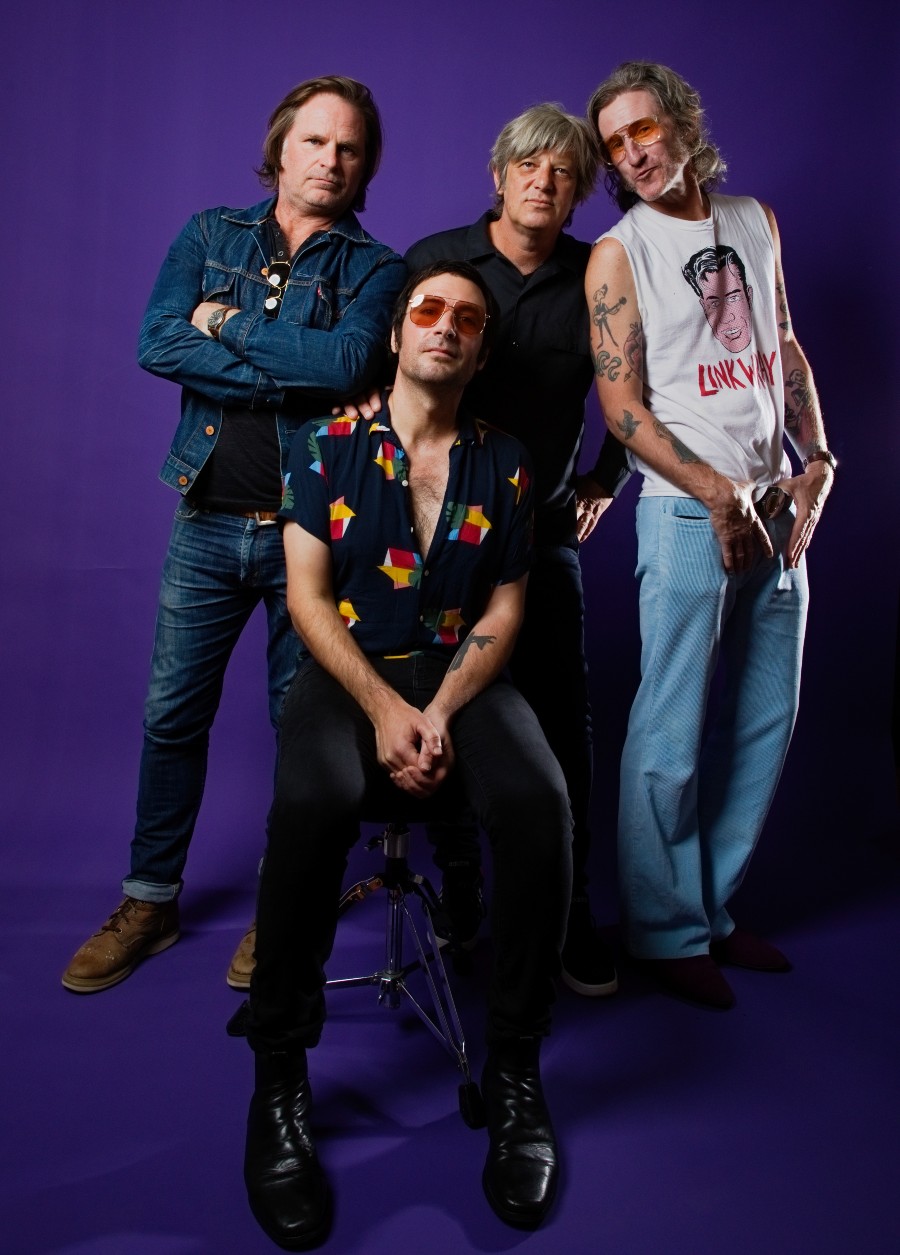
RUSTY: Yeah. It’s just very odd, but good.
DAVEY: The last record we made with Little House in Brooklyn, in this place called House of Soul, it was like forty degrees outside, and had like one old air conditioner, and we was supposed to make records, but it was like… it was completely opposite, with probably size of this room, and probably too close!
HAPPY: I also wanted to ask, you’re playing at the amphitheatre tomorrow night. How are you guys feeling about it?
DAVEY: Oh, just… that’s one of our favourites. It’s kind of a Sydney kind of go-to. Whenever I… it’s always when a show gets booked that’s, even if it’s way, way, months off in the distance, if you’re playing somewhere you haven’t played before, you’re like, ‘Imagine what that’ll be like!’ But when the The Enmore gets booked, you’re like, ‘I know what that’s…’ You can picture it in your mind, right down to the type of sandwiches!
RUSTY: Yeah, it’s great. The last time we played there, we did a benefit for our former manager who had a stroke, and the The Enmore kindly helped us host a benefit there, where we raised a whole bunch of money for her. So it’s always been one of those venues that feel like home. I feel like people like seeing bands going on, going to see stuff there… It’s just nice to be back playing.
DAVEY: Absolutely, yeah. Had a little taste of it a couple of weeks ago, playing a couple of pub gigs and at a festival by the sea, and now it’s nice to be back in a big room, where it’s our kind of show, and give the people what they hopefully want.
HAPPY: Do you have any sort of embarrassing stories, perhaps?
DAVEY: From performances in general, or…
HAPPY: Overall!
DAVEY: Where do we start?
RUSTY: I was twelve years old…
DAVEY: Embarrassing stories, I don’t know. I probably embarrass myself on such a regular basis…
RUSTY: Rock n roll is actually… I mean Spinal Tap is very, very true. And I can’t think of anything specific. I think we tend to have a pretty good time together. In fact, we’ve probably had some overly good times together. And I can’t really… I can’t think of anything too embarrassing.
DAVEY: No. It’s funny you mention Spinal Tap. I played a benefit last week in Melbourne for Roadies… I kind remember the exact name of it. Roadies for Roadies, or something like that. And I rocked up to play, and I had actually… the production person called me at quarter to one, and said ‘Just checking where you are.’ And I was like, ‘Yeah…’ I hadn’t put it in my diary. It was just something I was like, ‘I’ll remember that!’ Famous last words. I just hadn’t had a shower. I was like, ‘What time am I on?’ And she’s like, ‘Fifteen minutes.’ So I’m like, ‘Shit!’ Brush my hair, put a shirt on, go down and play. And it was the show… was just a little fifteen minute set, but it was a disaster. I didn’t bring a tuner, I was out of tune, kept dropping… my lead kept falling out. And it’s ironic that it was a thing for roadies, and I played a Spinal Tap song at the end, and was like, ‘This is… What you see here is a testament to the gigs…
DAVEY: Where you can’t find your drumkit, or you’re wearing no pants, or something like that.’
RUSTY: T-shirt, no pants… worst of all, nudity.
DAVEY: Yeah, then it’s like, this is why our stage crews are important. This is what happens with you turn into versions of Spinal Tap.
RUSTY: Yeah, I mean there’s… it’s just like everything. Like today. ‘What’s happening today? Oh, I’ve got to do this. That sounds very cool.’ We’re not very good at… we need to be herded. We do tend to… go missing sometimes. We’re not very good at…
RUSTY: We’ve got to keep in sted.
DAVEY: Yeah, time management isn’t… I’ll readily admit it’s not my forte.
HAPPY: I’ve never met a musician whose is, so…
DAVEY: Yeah, you know. I’d never trust a musician.
HAPPY: I guess I also wanted to ask, is there anything else you can reveal about this latest project? Is there anything you can give away?
RUSTY: Oh, um… I don’t know, it’s pretty just in-house, we put it all together ourselves. We all came up with the cover concept, I did all the layout and artwork and stuff. It’s very much from the ground to the… I mean, we involved our friend mixed it at the end, because we wanted to be able to just… rather than try and mix it ourselves, handed it over to someone with an objective kind of pair and ears…
RUSTY: And someone who’s worked with the band a bit. And we’ve worked with him for a while, and I think he was keen to get his hands on it. And it worked out well.
DAVEY: Yeah. And that aside, it’s probably the record that’s been the most hands on ever. Like, really just pulled it all together ourselves, because we couldn’t!
HAPPY: Yeah. I guess, is there anything else I haven’t asked that you think is important?
DAVEY: No.
RUSTY: Don’t know.
DAVEY: Yeah, obviously. I’m sure, if I had it…
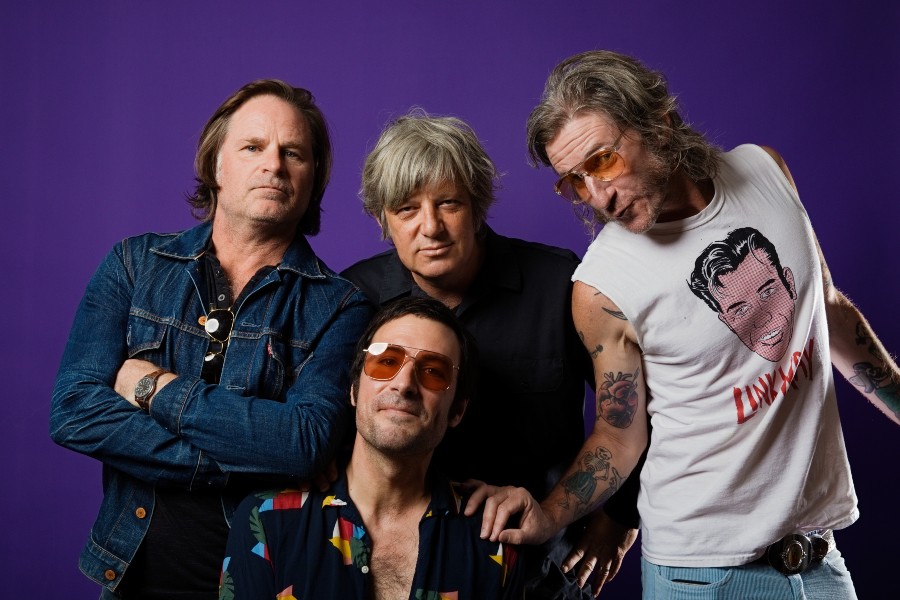
RUSTY: The record comes in three colours!
DAVEY: Yeah! It does.
RUSTY: Ulladulla sky, pinot grigio, and spearmint leaf!
HAPPY: What’s Ulladulla sky?
DAVEY: Oh, I worked for a record company, and one of our fun things to do was make up colours. Just kind of fun, so I was doing the artwork, and thought I was just going to make three colours and give it silly names. So Ulladulla sky is blue, when you’re driving to Ulladulla, you get a beautiful…
RUSTY: You know, translucent blue.
DAVEY: South coast sky! And Ulladulla is mentioned in Water Boy, so it seemed to tie it all in together from a marketing standpoint.
RUSTY: Absolutely.
HAPPY: Well, thank you so much, gents!
DAVEY: Thank you. Appreciate it!
The Lives Of Others is out now on all streaming services!
Interview by Mike Hitch
Photos by Four Minutes To Midnight
